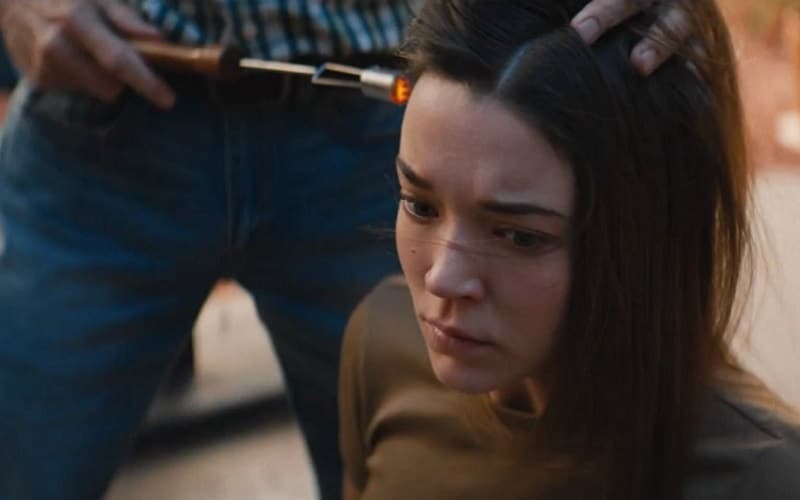
A criticism often levelled at modern Western society is that our sense of community is gone. We’re all out for ourselves, unable to see the wider picture – and we would be so much happier, if only we could take the time to get to know our neighbours, or we could throw ourselves into a different ethos. On the other side of that, the idea of belonging to any sort of a closed community which compels people to say goodbye to their old selves is a source of deep anxiety; any surveillance culture, or a community of enforced values, gives us pause for thought. Support comes, sure, but at what price? It’s a question which has underpinned some superbly-realised horrors in the past few years, and it’s absolutely the case in 1BR, a film which, yes, uses some familiar horror elements, but handles them with such sensitivity, economy and awareness that it’s a genuinely effective, unbearably tense ride.
Sarah (Nicole Brydon Bloom) is a young woman striking out on her own. An at-first unspecified schism with her father has made her feel that it’s finally time: time to stand on her own two feet in a new city, which happens to be LA. Sure, her car is a rust bucket and her new job is pretty monotonous, but as she begins looking for a new apartment, she finds an open house at a very attractive complex called Asilo Del Mar. It’s competitive, but she registers her interest and – as luck would have it – she gets accepted. Sarah is warmly welcomed by the folks already living at Asilo Del Mar. Perhaps this is the family vibe she’s been looking for: complex manager Jerry (Taylor Nichols) seems to believe she has potential. Feeling like her life is on the up, Sarah happily moves in.
Too good to be true? It starts out just fine, but odd sounds at night disturb her sleep and begin to impact upon her wellbeing. However, the tone alters when a note gets pushed under her door: the ‘no pets’ policy (which she’s flouting) has drawn a vicious personal complaint. Sarah begins to doubt those smiling faces, and she’s correct to do so – this picture-perfect neighbourhood is not all it seems and her predicament escalates shockingly, and quickly. All of that may sound, on the surface, fairly tried-and-tested; if I can do one thing with this review, I hope that it’s to communicate something of what makes this film work so well despite – at least superficially – sounding familiar to existing horror films.
To begin with, 1BR can boast very high production values, with a sense of the power and artistry inherent in well-composed shots, a sharp script and an understanding of what scares an audience, blending old fears (the assault on the self) with the new (how easy it is to make someone disappear when our lives are lived online). Straightforward know-how is used to superb effect; for example, director David Marmor frequently keeps the shots very closely on Sarah. This reduces the sense of anything existing outside, as well as maintaining a sense of the overbearing behaviour of the other residents. The steady early focus on Sarah’s sleep deprivation, too, is a subtle but pervasive feature; you empathise with this young woman trying desperately to make sense of her situation through the fugue of exhaustion. The atmosphere in 1BR is uncomfortable almost immediately; this is no mean feat either, given the sunny positivity on display at first (and elsewhere throughout the narrative). It all points to a very sharp understanding of genre. Yes, there is some signposting, and yes, there is some use of trope, but so carefully done that it is still highly effective to watch.
This notion of a wonderful, nurturing community which operates under ghastly and unfamiliar norms, right down to one scene in particular, put me in mind of Midsommar (2019); however, there’s no occult here, no sense of old beliefs creeping into the modern world. The horror of Asilo Del Mar is probably closer to Get Out (2017) and namechecks theories and ideologies which are rather closer to home, in terms of contemporary society at least. The idea of self-help and psychology forms the bedrock of the ordeal here, toying with bigger ideas about what constitutes happiness, what values we’re willing to drop or adopt, and what we will tolerate. ‘Conditioning’, and what people will do out of fear of some unspecified punishment calls to mind the Stanford Prison Experiment; the meticulous drilling-down through a person’s psyche corresponds to (rumoured, please don’t sue me) Scientology practices. This is all rather closer to home than a quaint commune in remote Sweden. This horror speaks our language.
1BR is a finely-honed appreciation of cruelty: what it can do, and how gratitude for its cessation can motivate a person to do incredible things. Its well-pruned version of mob rule offers an at-times excruciating, note-perfect attack on modern selfhood and through superb performances, it achieves everything it sets out to do. I’m reluctant to dip too far into plot details – see this one, and it’ll restore your faith in genre film.
